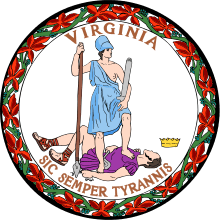William Fleming (governor)
| William Fleming | |
|---|---|
| 3rd Governor of Virginia | |
|
In office June 4, 1781 – June 12, 1781 | |
| Preceded by | Thomas Jefferson |
| Succeeded by | Thomas Nelson, Jr. |
| Personal details | |
| Born |
February 18, 1729 Jedburgh, Scotland |
| Died | August 5, 1795 (aged 66) |
| Spouse(s) | Anne Christian |
| Alma mater | University of Edinburgh |
| Profession | Physician, soldier and planter |
Colonel William Fleming (February 18, 1729 – August 5, 1795) was a physician, soldier, statesman, and planter who briefly acted as the Governor of Virginia during the American Revolutionary War. He is often confused with his contemporary, Judge William Fleming, who served in the Virginia legislature and was a delegate to the Continental Congress.
Biography
Fleming was born in Jedburgh, Scotland, to Leonard and Dorthea Fleming. He studied medicine at the University of Edinburgh and then entered the Royal Navy, serving as a surgeon's mate. While in the service, he was captured and imprisoned by the Spanish. After his release, he resigned from the navy and in 1755 emigrated to Virginia.
During the French and Indian War, Fleming was commissioned an ensign in George Washington's Virginia Regiment, and served as a surgeon in the Forbes expedition and in the Anglo-Cherokee War, among other actions. When the war ended in 1763, he married Anne Christian (sister of William Christian) and settled at Staunton, Virginia, where he practiced medicine. In 1768 he retired from medicine to farm at his estate called "Belmont" in Augusta County (now Roanoke County, Virginia). His investments in land eventually made him wealthy.
In Dunmore's War (1774), Colonel Fleming led the Botetourt County militia at the Battle of Point Pleasant. He continued to lead his men after being shot twice, but a third, more serious wound forced his withdrawal. A musket ball lodged in his chest was never removed and often caused him pain. Disabilities from these wounds, from which he never fully recovered, prevented his military service in the American Revolutionary War. The Virginia General Assembly awarded him £500 in compensation.
Fleming was active in politics during the American Revolution, representing a western district as a member of the Senate of Virginia. In 1781, British forces invaded Virginia and scattered Governor Thomas Jefferson and the Virginia legislature. When the legislature reconvened at Staunton, Jefferson's term had expired, and so Fleming, as senior member of the Virginia Council present, acted unofficially as governor. He served in this capacity from 4 June to 12 June, when Thomas Nelson was elected by the legislature as the next governor. During this brief time Fleming called out the Virginia militia to oppose the British invasion. A later resolution of the legislature retroactively legalized his actions. For this reason, he is regarded as the third governor of the commonwealth.
During and after the War for Independence, Fleming headed commissions to Kentucky to settle land disputes and attend to other official business. In 1784 he attended the Danville Convention, which paved the way for Kentucky's separation from Virginia. His final public service was as a Botetourt County delegate to the 1788 Virginia Ratifying Convention, which ratified the U.S. Constitution. Fleming had reservations about the new constitution, but he voted in favor of ratification as instructed by his constituents.
William Fleming High School in Roanoke, Virginia, is named for him. Their mascot is "The Colonel."
References
- Gordon, Armistead C., Jr. "William Fleming". Dictionary of American Biography.
- Grigsby, Hugh Blair. The History of the Virginia Federal Convention of 1788.... Richmond, Virginia: Virginia Historical Society, 1891. Includes a brief biographical sketch of Fleming.
- Hoyt, William D., "Colonel William Fleming in Dunmore's War, 1774" - Journal of West Virginia History (Volume 3, No. 2 (January 1942), pp. 99–119).
- Selby, John E. The Revolution in Virginia, 1775–1783. Williamsburg, VA: Colonial Williamsburg Foundation, 1988.
- Archival Records
External links
- "Marking History" from The News Leader of Staunton, Virginia has an entry about Fleming in Staunton. The article makes the common error of stating that Fleming served in the Continental Congress, confusing him with Judge Fleming.
- The statutes at large: being a collection of all the laws of Virginia, Virginia resolution from 23 June 1781 legalizing Fleming's actions as acting governor
| Political offices | ||
|---|---|---|
| Preceded by Thomas Jefferson |
Governor of Virginia 1781 |
Succeeded by Thomas Nelson, Jr. |
|
